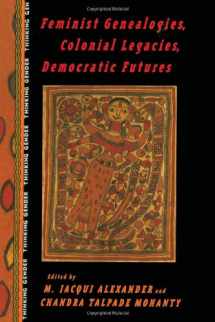
Feminist Genealogies, Colonial Legacies, Democratic Futures (Thinking Gender)
Book details
Summary
Description
Feminist Geneaologies, Colonial Legacies, Democratic Futures provides a feminist anaylsis of the questions of sexual and gender politics, economic and cultural marginality, and anti-racist and anti-colonial practices both in the "West" and in the "Third World." This collection, edited by Jacqui Alexander and Chandra Talpade Mohanty, charts the underlying theoretical perspectives and organization practices of the different varieties of feminism that take on questions of colonialism, imperialism, and the repressive rule of colonial, post-colonial and advanced capitalist nation-states. It provides a comparative, relational, historically grounded conception of feminist praxis that differs markedly from the liberal pluralist, multicultural understanding that sheapes some of the dominant version of Euro-American feminism. As a whole, the collection poses a unique challenge to the naturalization of gender based in the experiences, histories and practices of Euro-American women.


We would LOVE it if you could help us and other readers by reviewing the book
Book review



